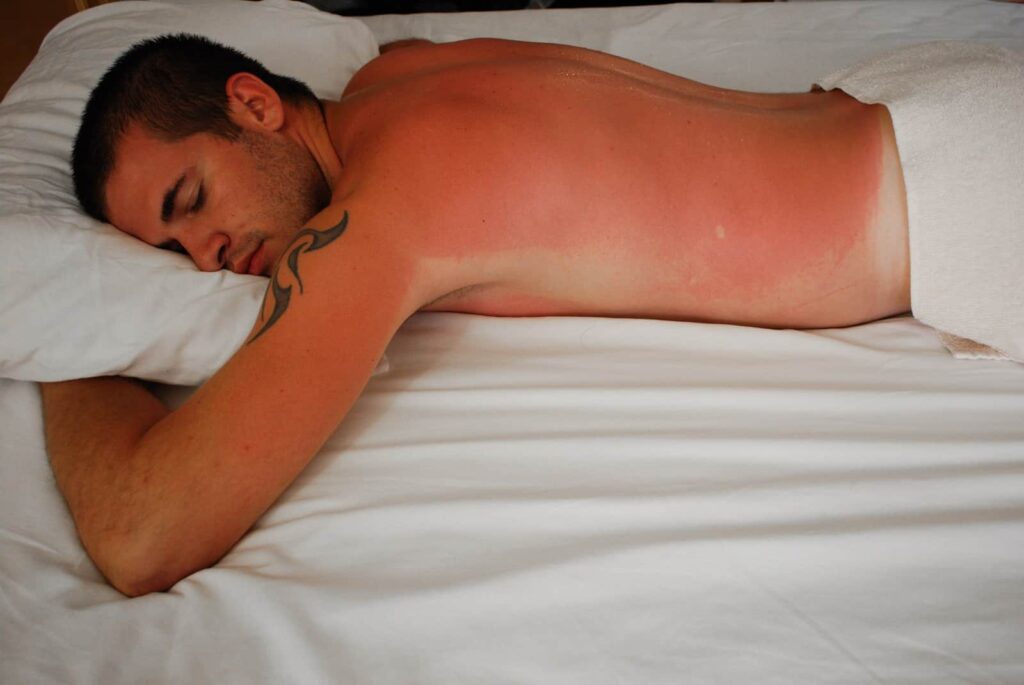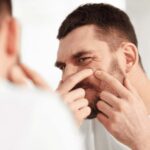It’s hot outside, your skin is burned, and now you can’t sleep. Of course, you know that you should always wear sunscreen when you go outdoors. But if you missed a spot or accidentally forgot to reapply which happens to the best of us), it can be quite painful. Unfortunately, that pain doesn’t go away when you sleep, and sleeping with a sunburn can lead to a lot of discomfort and restlessness.
Sunburns occur when your skin is exposed to excessive sunlight without protection. They can be extremely painful to live with, and you can even get a sunburn through a shirt or clothing.
Anyone who has experienced a severe sunburn knows the struggle of trying to sleep with the burning pain. Even if it’s usually difficult for you to sleep on your back, it can be challenging to find a comfortable position to sleep with a sunburn.
Please note that it’s important to take proper care of your sunburned skin to promote healing and alleviate discomfort.
Why Do Sunburns Feel Worse at Night?
Many of my patients often report that their skin symptoms, whether from sunburn or skin conditions, seem to worsen at night. During the quiet and less distracting nighttime hours, there are fewer things to divert your attention from the constant itch and pain of a sunburn. This can give the subjective impression of increased discomfort.
While sunburns can occur in less than 30 minutes of unprotected sun exposure, it takes some time for the sunburn to fully develop and cause maximum pain. This discrepancy in timing can lead to a situation where you underestimate the extent of the damage until later at night when the pain and itchiness become more pronounced.
Effective Ways to Find Quick Relief from Sunburn
The secret to finding comfort and improving your sleep during sunburn can be as simple as using cooling mattress sheets. These sheets not only provide relief for your sunburn but also help lower your body temperature, allowing you to sleep more comfortably throughout the night.
If you’re experiencing difficulty sleeping due to sunburn on your back, it’s okay to take some pain relievers. Although they may take up to an hour to take effect, they can help you fall asleep and stay asleep.
It’s important to resist the urge to scratch or constantly fuss over your sunburned skin while sleeping. Rest and sleep are crucial for the healing and recovery of damaged tissues
Moisturize with Aloe
Aloe vera is rich in vitamins A and E, which are beneficial for soothing sunburned skin. For an extra cooling effect, you can refrigerate the aloe vera bottle before applying it to your skin. Applying aloe vera gel or moisturizing cream can help alleviate various symptoms of sunburn and hydrate your parched skin. The great thing about aloe vera is that it provides moisture to the skin without leaving any stickiness on your bed or pillows.
Coconut oil for sunburns
Coconut oil can be used as a skin moisturizer after the sunburn has started to heal. However, it’s important to note that coconut oil should not be used as a substitute for sunscreen. Coconut oil does not provide UV or SPF protection, so relying on it alone can increase the risk of getting sunburned. When it comes to relieving sunburn, a small amount of essential oils like lavender or helichrysum can be applied to the skin for soothing effects.
Drink plenty of water
Sunburns can cause dry and dehydrated skin. When you get sunburned, your skin draws fluid to the affected area, which can result in dehydration. To support the healing process of your sunburned skin, it’s important to stay hydrated by drinking plenty of water throughout the day. This will help replenish lost fluids and promote faster recovery from sunburn.
Bath good for sunburn
After a sunburn, taking a refreshing shower can help keep your body temperature low and provide some relief. When you finish your shower, it’s important to apply moisturizer to your skin while it’s still damp. Instead of rubbing your skin dry, gently pat it with a towel to avoid further irritation.
It’s best to avoid using soap or perfumes in the bathwater as they can be drying on already dry and sunburned skin. Opt for mild, fragrance-free products to prevent further discomfort and dryness. Taking these precautions can help soothe your sunburned skin and promote healing.
Use pain medication for sleep with sunburn
Medication can provide relief from the pain, swelling, and redness caused by sunburn. Ibuprofen or aspirin are effective options to help alleviate discomfort and make it easier for you to fall asleep. While these medications provide quick relief, it’s important to note that their effects may not last for an extended period of time.
TAKE ASPIRIN OR IBUPROFEN
Both ibuprofen and aspirin are anti-inflammatory medications that can help reduce swelling, redness, and discomfort associated with sunburn.
Apply hydrocortisone
To alleviate itching, swelling, and discomfort, you can apply hydrocortisone. It is available in various forms such as ointments, lotions, sprays, and creams, and it can effectively reduce swelling, redness, itching, and overall skin discomfort caused by sunburn.
Choosing Comfortable Attire for Sleeping with Sunburn
When managing sunburn pores and skin, make sure to stick to loose-becoming, breathable fabric that offers affected areas plenty of airflows as they need to reduce itching. Furthermore, you have to opt for breathable substances like cotton over something like polyester or nylon. Wearing loose-fitting clothing is nice for sleep (a mild cotton T-blouse or woven cotton pajamas). Don’t wear silk or nylon to bed after slathering on your aloe or hydrocortisone mix. The topical merchandise will wreck silk apparel or sheets.
Conclusion
Sleeping with a sunburn may be a tight and uncomfortable revel for anyone. These recommendations are sure to help you relieve your ache and inflammation to get an excellent night’s rest.
Medical Disclaimer: All the content available on the website is just for informational purposes. It’s not a substitute for any Professional advice. Don’t take it personally. As a medical student, I’m just trying to use my information through my content, and please keep in mind it’s not written by a professional doctor. Use the data just for educational purposes.
Disclaimer: The content on Wellness Derive is for informational purposes only and not a substitute for professional medical advice, diagnosis, or treatment. Always consult a healthcare provider for medical concerns.



